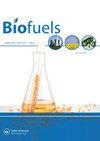A combined study of filterability and soaking strength of fuel filter and effect of injection timing on CI engine characteristics using Ceiba pentandra biodiesel
IF 2.6
4区 工程技术
Q3 ENERGY & FUELS
引用次数: 1
Abstract
Abstract Biodiesel is currently utilised as an alternative to conventional fuels. However, blends only up to a particular ratio improve the engine performance and fuel filterability. Higher biodiesel concentrations may cause diesel fuel filter clogging. The influence of blends of Ceiba pentandra (kapok) biodiesel (B0–B100 in 20% increments) on fuel filter blocking tendency, pressure drop, and soaking strength was investigated through filter media analysis. Fuel filter performance was similar to diesel up to B20, but higher blends had a detrimental effect. As per the filterability results, B20 was selected for further evaluation. Injection timing (IT) of fuel was the most influential parameter on the performance, combustion, and emission behaviour of diesel engines. This work aims to improve engine performance and emissions by altering IT from 21° before top dead centre (BTDC) to 27° BTDC with Ceiba pentandra biodiesel (B20), and results are compared with diesel at IT of 23° BTDC. Advanced IT (27° BTDC) caused lower brake specific fuel consumption (20%) and higher brake thermal efficiency (13%), and we observed low HC and smoke emissions at all advanced ITs. A reduction by 23.5% and 7.5% in hydrocarbon and smoke, respectively, was seen at 27° BTDC.以木棉生质柴油为燃料,研究了燃油滤清器的过滤性能和浸泡强度,以及喷射时间对发动机性能的影响
摘要生物柴油目前被用作传统燃料的替代品。然而,只有达到特定比例的混合物才能提高发动机性能和燃油过滤能力。较高的生物柴油浓度可能会导致柴油滤清器堵塞。通过过滤介质分析,研究了木棉生物柴油(B0–B100,增量为20%)对燃油滤清器堵塞倾向、压降和浸泡强度的影响。在B20之前,燃油滤清器的性能与柴油相似,但较高的混合物会产生不利影响。根据可过滤性结果,选择B20进行进一步评估。燃油喷射正时(IT)是影响柴油机性能、燃烧和排放行为的最重要参数。这项工作旨在通过使用Ceiba pentandra生物柴油(B20)将IT从上止点前21°(BTDC)更改为27°BTDC来改善发动机性能和排放,并将结果与IT为23°BTDC的柴油进行了比较。先进的IT(27°BTDC)降低了制动比油耗(20%),提高了制动热效率(13%),我们观察到所有先进IT的HC和烟雾排放都很低。在27°BTDC时,碳氢化合物和烟雾分别减少了23.5%和7.5%。
本文章由计算机程序翻译,如有差异,请以英文原文为准。
求助全文
约1分钟内获得全文
求助全文
来源期刊

Biofuels-Uk
Energy-Renewable Energy, Sustainability and the Environment
CiteScore
5.40
自引率
9.50%
发文量
56
期刊介绍:
Current energy systems need a vast transformation to meet the key demands of the 21st century: reduced environmental impact, economic viability and efficiency. An essential part of this energy revolution is bioenergy.
The movement towards widespread implementation of first generation biofuels is still in its infancy, requiring continued evaluation and improvement to be fully realised. Problems with current bioenergy strategies, for example competition over land use for food crops, do not yet have satisfactory solutions. The second generation of biofuels, based around cellulosic ethanol, are now in development and are opening up new possibilities for future energy generation. Recent advances in genetics have pioneered research into designer fuels and sources such as algae have been revealed as untapped bioenergy resources.
As global energy requirements change and grow, it is crucial that all aspects of the bioenergy production process are streamlined and improved, from the design of more efficient biorefineries to research into biohydrogen as an energy carrier. Current energy infrastructures need to be adapted and changed to fulfil the promises of biomass for power generation.
Biofuels provides a forum for all stakeholders in the bioenergy sector, featuring review articles, original research, commentaries, news, research and development spotlights, interviews with key opinion leaders and much more, with a view to establishing an international community of bioenergy communication.
As biofuel research continues at an unprecedented rate, the development of new feedstocks and improvements in bioenergy production processes provide the key to the transformation of biomass into a global energy resource. With the twin threats of climate change and depleted fossil fuel reserves looming, it is vitally important that research communities are mobilized to fully realize the potential of bioenergy.
 求助内容:
求助内容: 应助结果提醒方式:
应助结果提醒方式:


